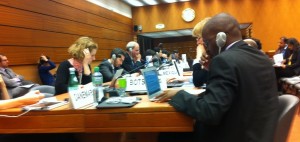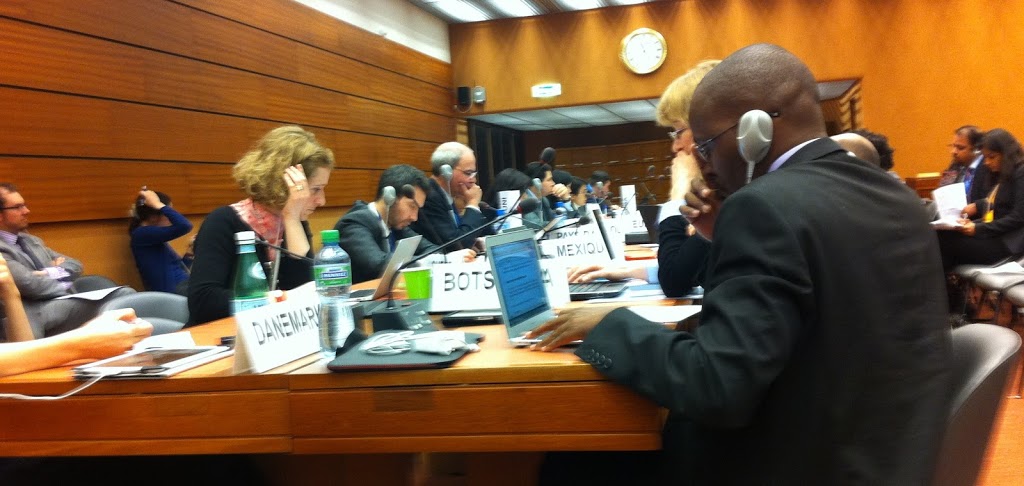 |
| Participants at the consultative meeting on 08th March @ UNHRC |
The 2nd draft resolution was taken up on the 8th afternoon for discussion by the US. The preamble and the operational part were clearly explained by the US Ambassador to the UN Ms.Eileen Chamberlain Donahoe, who told the participants that US wanted to constructively engage Sri Lanka, unfortunate Sri Lanka did not respond positively despite high level delegation visits. She cited the visit of Mr.G.L.Pieris to Washington to meet Ms.Hilary Clinton. Colombo has refused working on a joint resolution. There were new elements in the text when compared to resolution 19/2 brought in March 1012.
The preamble and the operational paragraph were read out and the US ambassador stressing that the GoSL should implement the recommendations of the Office of the UN High Commissioner for Human Rights report along with the Lesson Learnt and Reconciliation Commission and the National Action Plan.
In response Sri Lanka was given the opportunity to make their point. Mr.Ravinatha Aryasinha, the Sri Lankan Permanent Representative of Sri Lanka to the United Nations in Geneva spoke from a written text. He stated that GoSL does not recognize resolution 19/2 passed last march as it was unfair, unjust, against genuine dialogue and politically motivated. It went against the spirit of engagement as Sri Lanka always reciprocated with an open mind.
He pointed out that the UN High Commissioner for Human Rights went beyond her mandate and stated that the present resolution was misconceived and arbitrary, far from being a procedural resolution.
There were no appreciation of the positive contributions Sri Lanka had made towards reconciliation including IDP resettlement, reduction of High Security Zones, demilitarization, landmine clearance, infrastructural development, creation of employment opportunities etc.
The first country to respond before the para by para discussion was taken up was Japan which stated that Sri Lanka was cooperating with the International Community and were not like North Korea.
European Union (EU) supported the resolution on the ground that it was important to give justice to the victims along with fixing accountability.
China opined that the resolution should have reflected the positive side of reconciliation and it was unfair to single out Sri Lanka as they had cooperated through the Universal Periodic Review (UPR). Russia supported the Chinese claims and called the resolution as intrusive and political.
Venezuela made it clear that it does not support any country specific resolution and observed that the GoSL was working hard on human rights!
Pakistan called the 19th session resolution as unwanted, unwarranted and imbalanced and proposed changes to the present draft.
Iran felt that the mandate given in the 19/2 resolution was negated and deviated. The US had turned a blind eye to the progress made by the GoSL and the main approach should be constructive dialogue.
Canada felt that the GoSL had sadly failed the victims. The present resolution is a necessary initiative, the No Fire Zone of Channel 4 did not convince any viewer of progress made by the GoSL.
Cuba was against any country specific resolution and the best option was the UPR where countries voluntarily agreed to work to enhance human rights. They felt Sri Lanka needs space and time to implement the LLRC.
Thailand felt that dialogue and cooperation were better than bringing country specific resolutions. They were concerned that this year’s draft departs from resolution 19/2 and the text was not balanced and the reconciliation process will take time.
Indonesia supported Sri Lanka based on their own experiences dealing with such situations.
UK supported the resolution in it full content and felt the new elements introduced in this resolution was necessary. They shared their concern on the ongoing violations, welcoming the resolution.
Germany was for the resolution and stated that they have seen changes in infrastructure but wanted to know the progress in accountability and reconciliation.
France felt that the resolution was very important and appreciated the work of the US.
Austria reminded that they had co-sponsored the 19/2 last year and felt there was no substantial progress achieved on political power devolution, and observed that the attack on judiciary was not addresses by the GoSL. Norway too supported the resolution.
When the discussion came up Pakistan wanted to redraft the resolution by praising the work done by Sri Lanka welcoming and acknowledging the reconciliation process including resettlement of IDPs, demining and devellopoing livelihood.
UK felt that the situation was far from being normal. Austria stated that nobody should be confused with infrastructure development and political process. Canada observed that ‘High ways have come and facilitated the influx of other people’.
Pakistan,Cuba,China,Russia,Indonesia wanted the removal of Preamble para 9 and 10 to be removed but Germany, Switzerland, Denmark,Austria, UK, France Sweden wanted the paras to be kept as it is with Canada wanting to add that there should be freedom of religion observing that the Muslim community had become the latest target. Egypt wanted a change of word from failure to urge.
Moving on from there European Union wanted to note the large number of rejections of the UPR recommendations made to Sri Lanka, there was a dispute here as most countries including many from Europe and Africa felt that the UPR was a voluntary submission and countries had the right to select and reject recommendations.
Coming to the Operational para, Russia said that it would not welcome the report of the OHCHR as International investigations would directly interfere into the sovereignty of Sri Lanka and wanted the para to be deleted. China, Thailand and Indonesia supported Russia with Indonesia stating that the report of the OHCHR was not legally binding.
Austria wanted the para to be as it was, UK stated that the report of the OHCHR was based on the resolution passed last year. Chile welcomed the para. Switzerland stated that it was well written. Canada felt it was an important element and spoke of transitional justice and made a few recommendations which included appointment of a special commissioner to Inquire Enforced Disappearances and assimilation of minorities in decision making. They also observed that the report of the Office of the High Commissioner for Human Rights added value to the entire exercise.
As time was running out it was clear that among those who participated in the discussions that Pakistan, a great democracy was trying to speak on behalf of Sri Lanka. Russia, China,Cuba,Iran had objections to everything though they voted against the last resolution and do not have a vote this time. Clearly Japan, Indonesia, Venezuela, Pakistan and Thailand would not vote for the resolution.
On the other hand it looked as though Angola, Sierra Leone, Austria, Botswana, Switzerland, Germany among the voting members would surely vote for the US sponsored resolution. Now the million dollar question in everyone’s mind was why India had zipped its mouth without uttering a word during the entire proceedings being the world’s largest democracy especially after its former External Affairs minister Mr.Yeshwanth Sinha had reminded India that “Foreign policy is not conducted out of fear, but with confidence and elan.”
Dr.Paul Newman from the 22nd UNHRC, Geneva, Switzerland.
